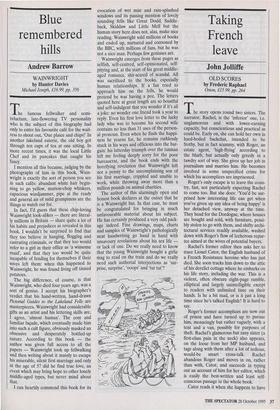Blue remembered hills
Andrew Barrow
WAINWRIGHT by Hunter Davies Michael Joseph, £16.99, pp. 356 The famous fellwalker and semi- reluctant, late-flowering TV personality who is the subject of this biography had only to enter his favourite café for the wait- ress to shout out, 'One plaice and chips!' In another lakeland eaterie, the old boy got through ten cups of tea at one sitting. In more recent times, it was the local Little Chef and its pancakes that caught his fancy.
I mention all this because, judging by the photographs of him in this book, Wain- wright is exactly the sort of person you see in such cafés: abundant white hair begin- ning to go yellow, mutton-chop whiskers, capacious windjammer, pipe at the ready and general air of mild grumpiness are the things to watch out for.
In fact, I'd guess that these chip-loving Wainwright look-alikes — there are literal- ly millions in Britain — share quite a lot of his habits and prejudices as revealed in this book. I wouldn't be surprised to find that they too believe in hanging, flogging and castrating criminals, or that they too would refer to a girl in their office as 'a winsome maid', and that they too would be quite incapable of fending for themselves if their wives left them: when this happened to Wainwright, he was found living off tinned potatoes.
The big difference, of course, is that Wainwright, who died four years ago, was a sort of genius. I accept his biographer's verdict that his hand-written, hand-drawn Pictorial Guides to the Lakeland Fells are masterpieces. Wainwright had considerable gifts as an artist and his lettering skills are, I agree, 'almost human'. The cosy and familiar façade, which eventually made him into such a cult figure, obviously masked an obsessive and desperately bottled-up nature. According to this book — the author was given full access to all the papers — Wainwright took up fellwalking and then writing about it mainly to escape his miserable, silent first marriage and only at the age of 57 did he find true love, an event which may bring hope to other lonely middle-aged types, but never mind about that.
I can heartily commend this book for its evocation of wet mist and rain-splashed windows and its passing mention of lovely sounding fells like Great Dodd, Saddle- back, Skiddaw and Little Me11 but the human story here does not, alas, make nice reading. Wainwright sold millions of books and ended up, nurtured and cocooned by the BBC, with millions of fans, but he was not a nice man. Perhaps few geniuses are.
Wainwright emerges from these pages as selfish, self-centred, self-opinionated, self- pitying and, at the start of his great middle- aged romance, shit-scared of scandal. All was sacrificed to the books, especially human relationships. If a fan tried to approach him on the fells, he would pretend he was having a pee. The letters quoted here at great length are so boastful and self-indulgent that you wonder if it's all a joke: no wonder one friend took a year to reply. Even his first love letter to the lucky lady who was to become his second wife contains no less than 31 uses of the person- al pronoun. Even when he finds the happi- ness he yearns for, he remains ruthlessly stuck in his ways and officious into the bar- gain: his latterday triumph over the taxman left me feeling deeply sorry for the poor bureaucrat, and the book ends with the horrifying revelation that Wainwright left not a penny to the uncomplaining son of his first marriage, crippled and unable to work, while throwing away more than a million pounds on animal charities. The author of this alarmingly open and honest book declares at the outset that he is a Wainwright fan. In that case, he must be congratulated for bringing in much unfavourable material about his subject. He has certainly produced a very odd pack- age indeed. Fine drawings, maps, charts and samples of Wainwright's pathologically neat handwriting go hand in hand with unsavoury revelations about his sex life or lack of one. Do we really need to know that the young Wainwright bought a girlie mag to read on the train and do we really need such authorial interjections as 'sur- prise, surprise', '000ps' and 'tut tut'?


































































 Previous page
Previous page